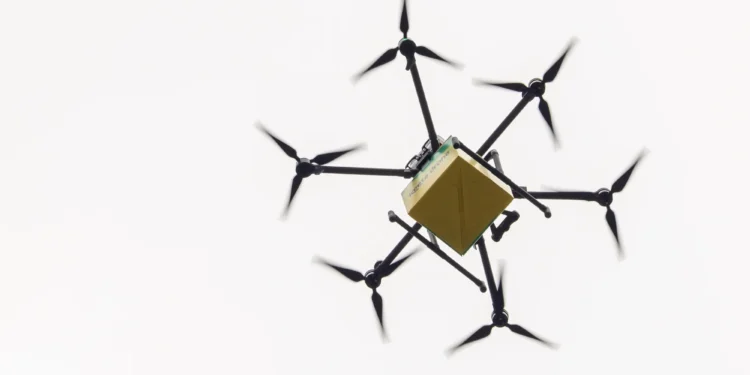Chinese food delivery giant Meituan is bringing more flying robots to Dubai’s skies. The Beijing-based company will add two to three new drone delivery routes in Dubai during the second half of 2025. This expansion comes just months after launching its first overseas drone service in the Middle Eastern city.
Meituan operates its drone service outside China under the brand name Keeta Drone. The company’s Vice President Yinian Mao says the new routes will fly over Dubai Marina’s waterfront area. These flights will be “very highly visible” to residents and visitors.
The Chinese tech company first tested drone deliveries in Dubai in December 2024. Sheikh Hamdan bin Mohammed bin Rashid Al Maktoum, Dubai’s crown prince, placed the first official order when the service launched. Keeta Drone received the UAE’s first commercial license for beyond visual line of sight drone deliveries.
Dubai First Stop for Global Expansion
Dubai became Meituan’s testing ground for international drone services, even though the company first launched regular food delivery in Saudi Arabia. The choice came down to regulations. Dubai has more open policies for drone operations compared to other Middle Eastern cities.
Mao visited Dubai multiple times in 2024 to set up operations. The company stationed full-time employees in the city and built partnerships with local restaurants. Current delivery zones include the Rochester Institute of Technology campus and Dubai Digital Park.
The drones can carry packages weighing up to 2.3 kilograms. They deliver food from restaurants to automated pickup hubs where customers collect their orders. The service also plans to add medical deliveries by working with local hospitals.
Strong Track Record in China
Back home in China, Meituan operates 53 drone routes across major cities including Beijing, Shenzhen, Shanghai, and Guangzhou. The company completed over 450,000 drone deliveries by late 2024. One popular route even delivers food to tourists visiting the Great Wall of China.
The company began developing drone technology in 2016. Its fourth-generation drones are made from carbon fiber and weigh about four kilograms. Each drone can fly in various weather conditions and navigate complex urban areas.
Most of Meituan’s Chinese drone routes operate in Shenzhen, the country’s tech hub. The company processes about 1,000 drone orders daily across all its routes combined.
Middle East Opportunities
The Middle East presents unique advantages for drone delivery services. Summer temperatures often reach extreme levels, making traditional delivery difficult for human workers. The region’s road networks can be complex, with artificial islands and limited entry points to many areas.
“Two points that appear close might require long detours to connect by road. A drone, however, can traverse just a few hundred meters.” explains a source familiar with Meituan’s operations.
Dubai’s government supports drone innovation through programs like the “Dubai Program to Enable Drone Transportation.” The city aims to cover one-third of its urban area with drone delivery networks by 2030.

Future Growth Plans
Meituan expects drone deliveries to handle 10 to 15 percent of all instant delivery orders globally in the future. The technology works best for high-priority items like emergency supplies or medical products.
The company also announced plans to add four to five new drone routes in Shanghai later this year. Some of these routes will cross the Huangpu River, connecting different parts of the city.
Beyond Dubai, Meituan launched drone deliveries in Hong Kong in March 2025. The service charges customers about $4 per delivery in Hong Kong.
Cost Challenges Remain
Drone delivery still costs more than traditional methods, but Meituan claims significant year-over-year cost reductions. The company projects drone costs could match ground-based delivery within three to five years.
Higher labor costs in the Middle East could make drone operations more profitable compared to China. However, the technology still faces hurdles including limited flight ranges, weather restrictions, and regulatory constraints.
The current hub-based system requires customers to collect packages from automated lockers rather than receiving doorstep delivery. Future technology improvements may enable more flexible coverage areas.
Growing Market Interest
The Middle East and Africa drone delivery market generated $8.1 million in revenue during 2023. Industry experts predict the market will grow at 41.7 percent annually through 2030.
Other companies are also exploring drone deliveries in the region. Matternet recently received approval to operate its M2 drone in Saudi Arabia, while several local startups are developing delivery solutions.
Meituan’s Dubai expansion represents part of its broader international growth strategy. The company operates food delivery services in multiple countries through its Keeta brand, with Saudi Arabia being its largest overseas market outside of China.
The success of drone deliveries in Dubai could influence expansion to other Middle Eastern cities. However, each market requires separate regulatory approvals and infrastructure development.














